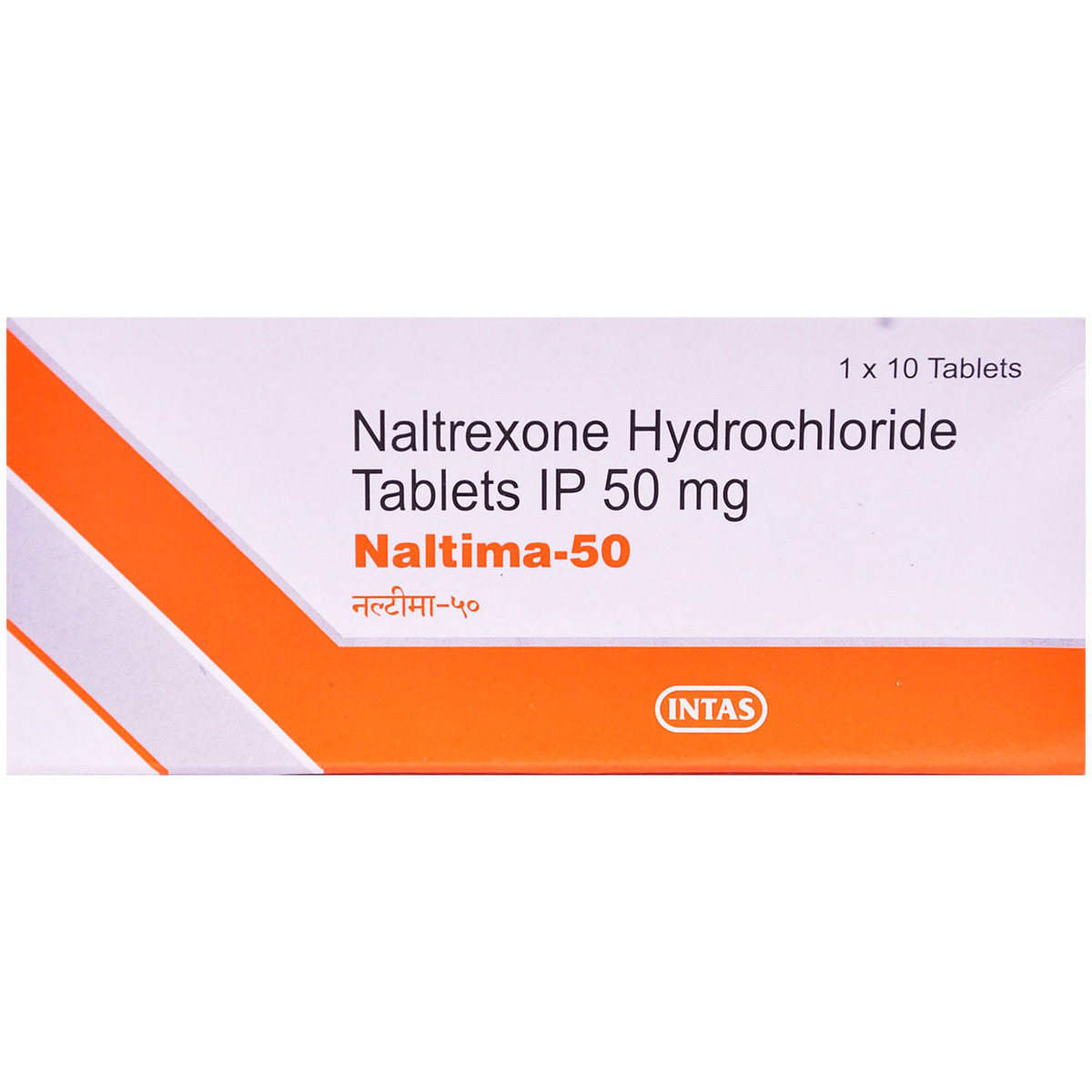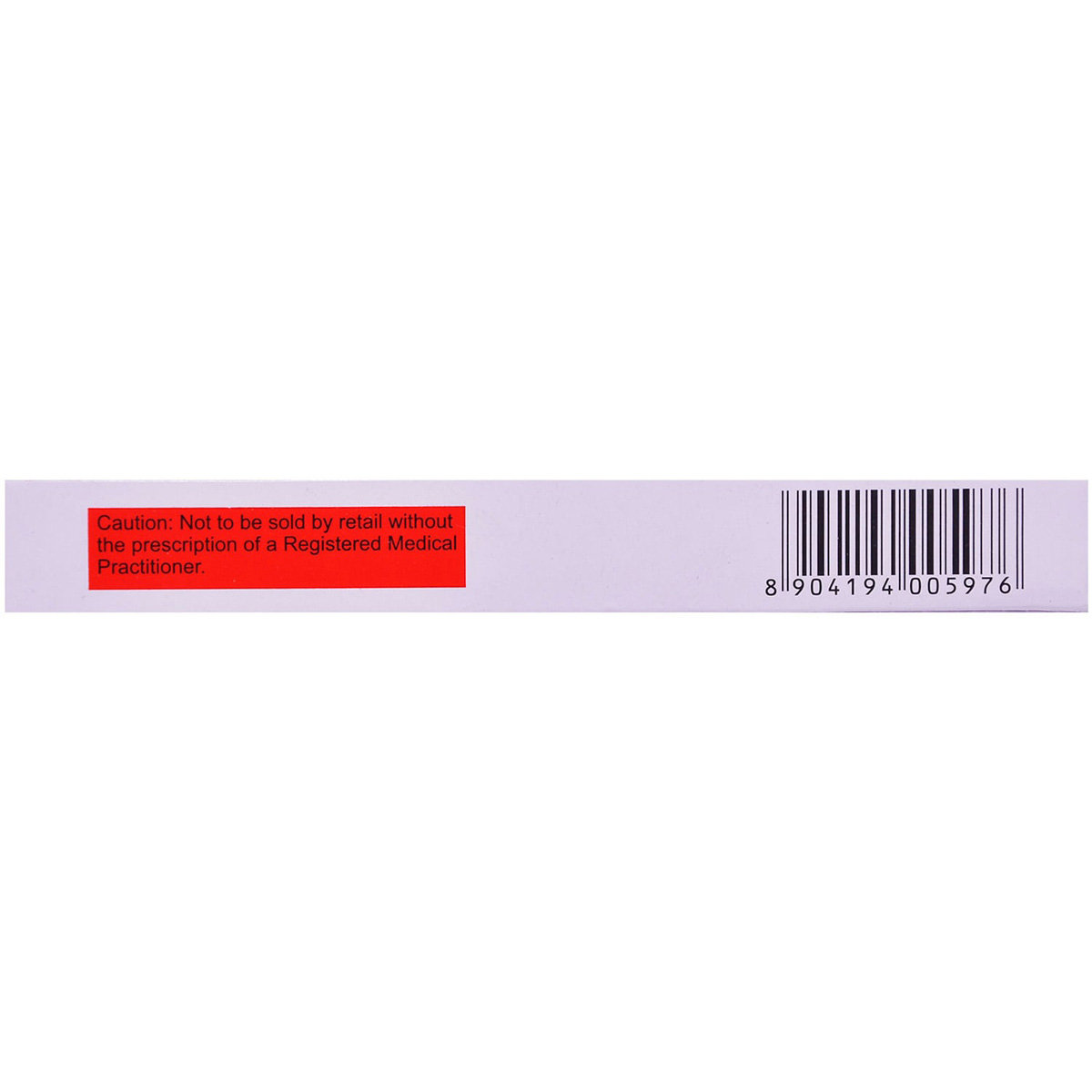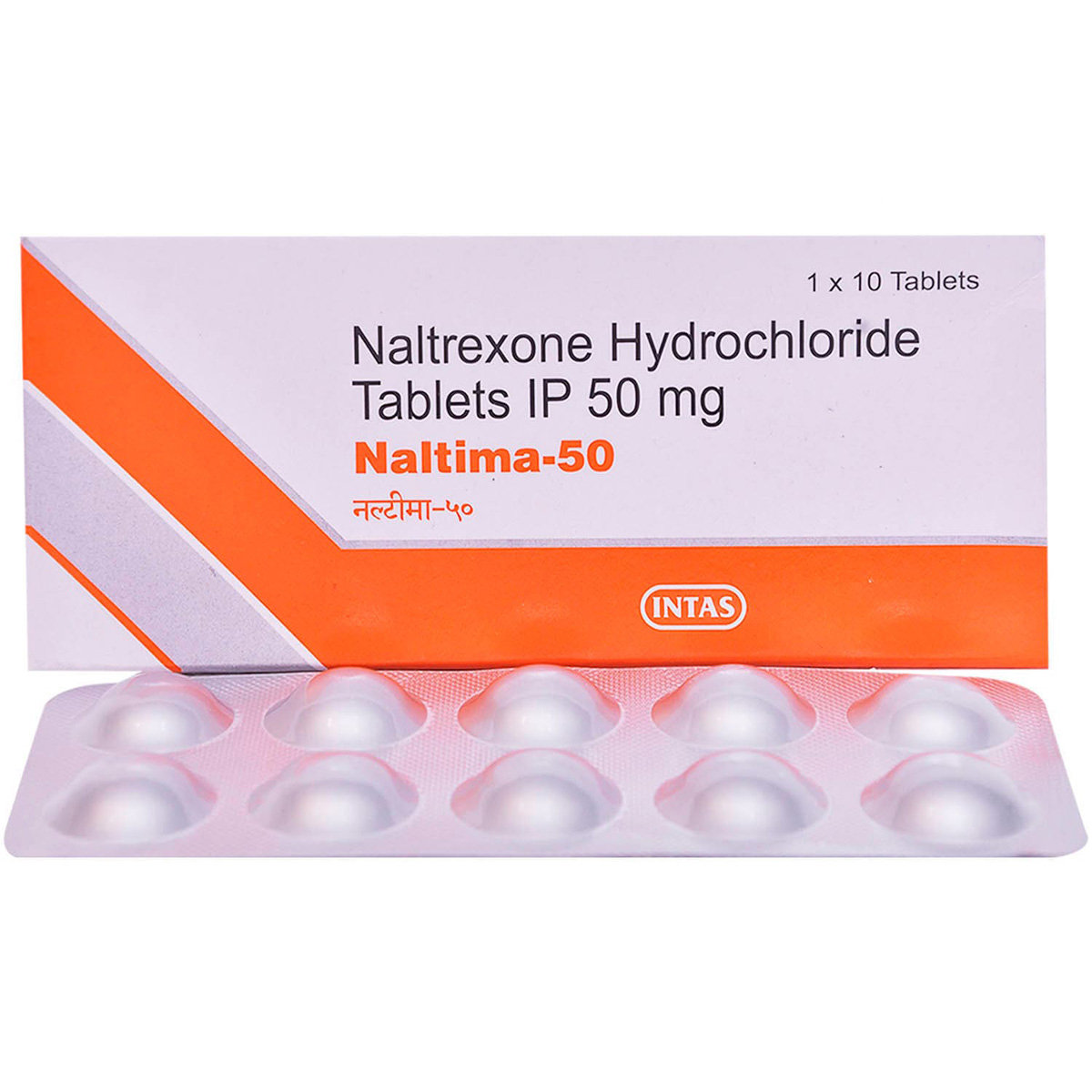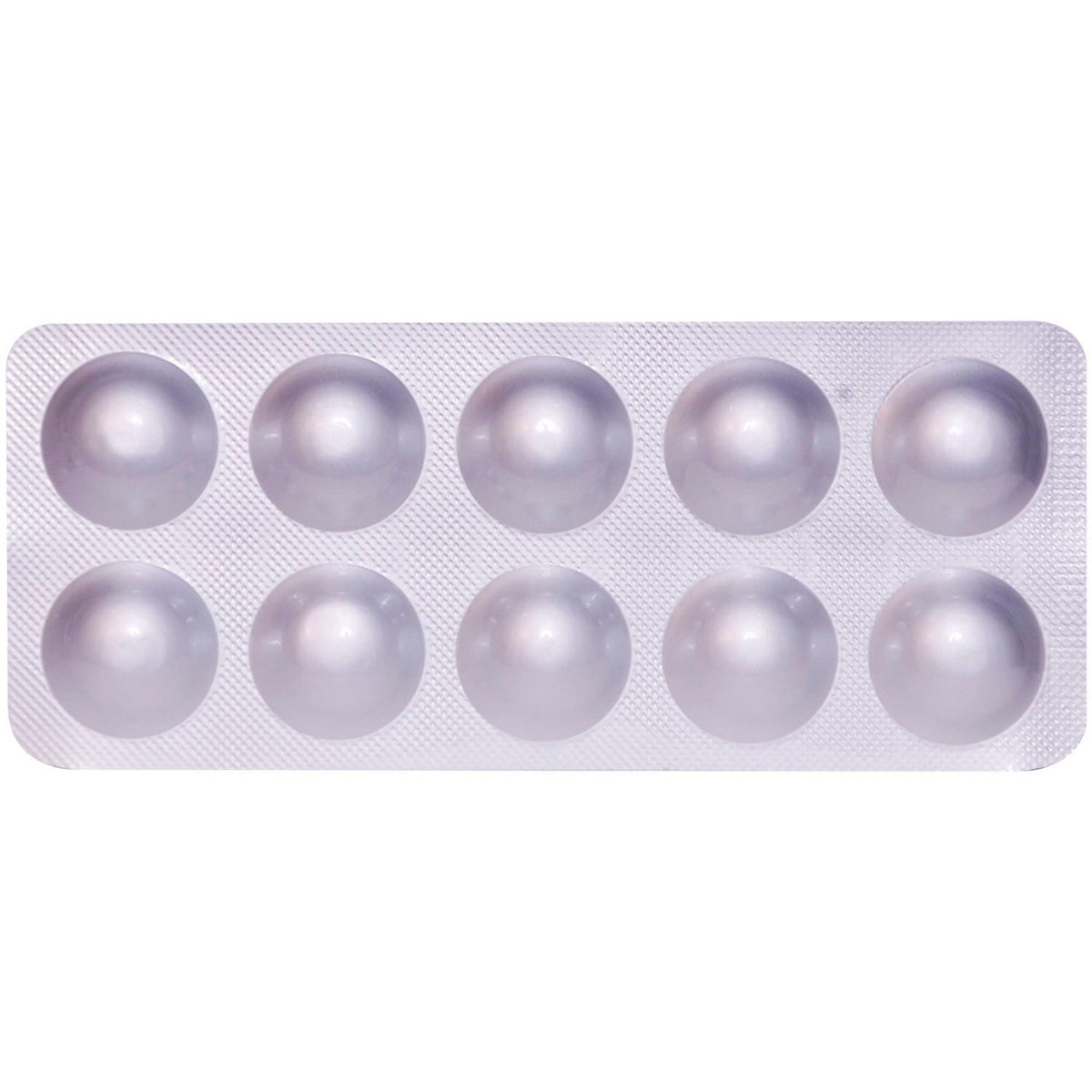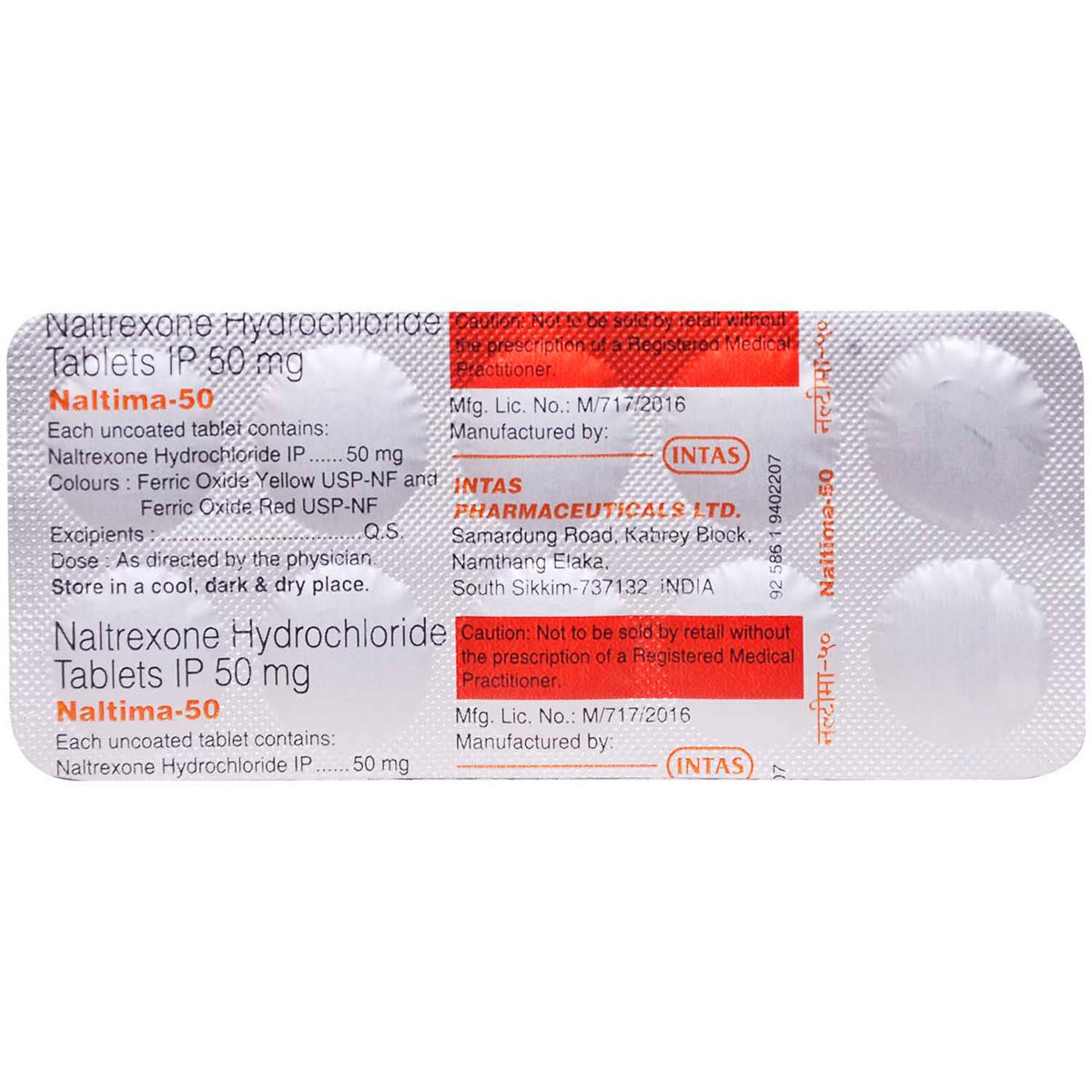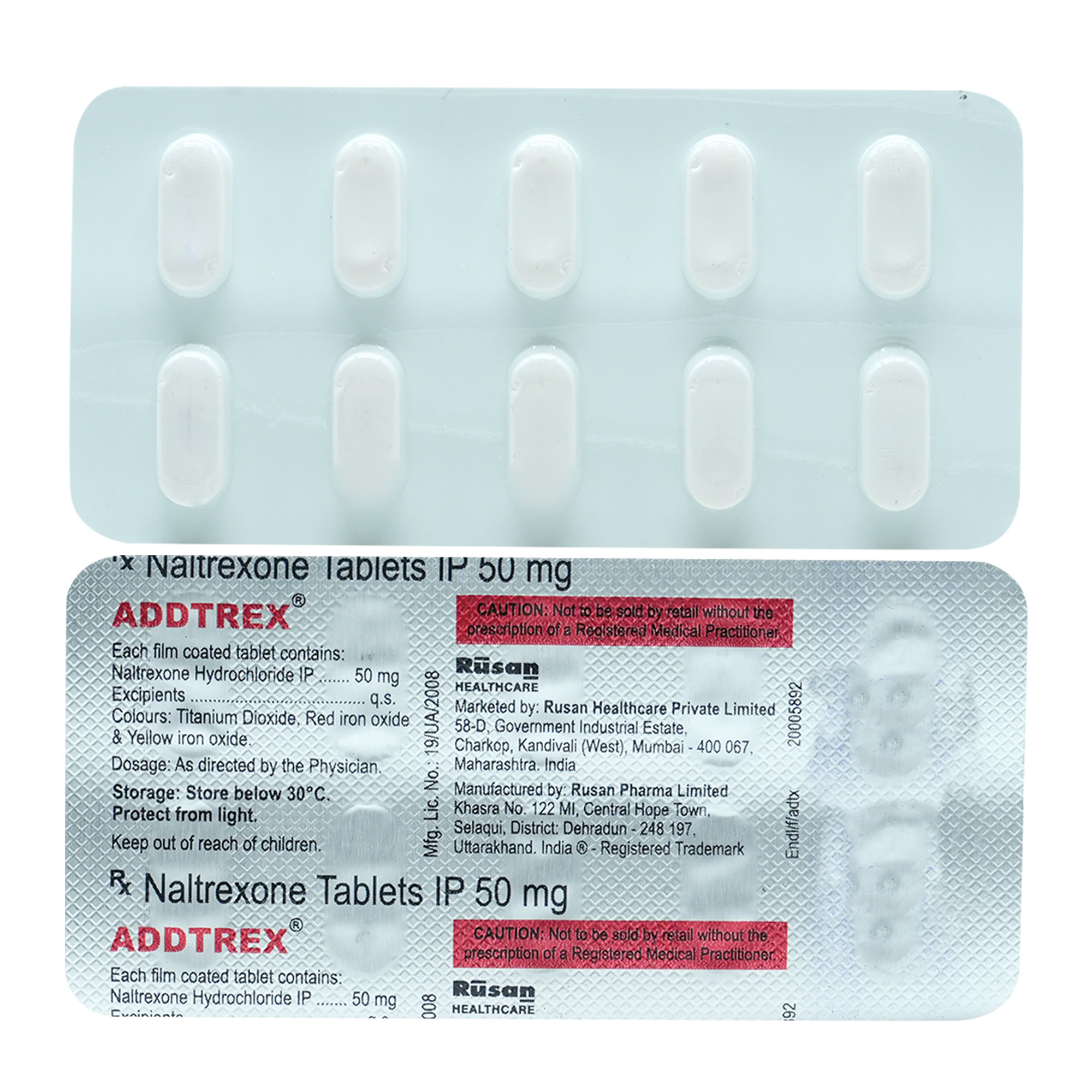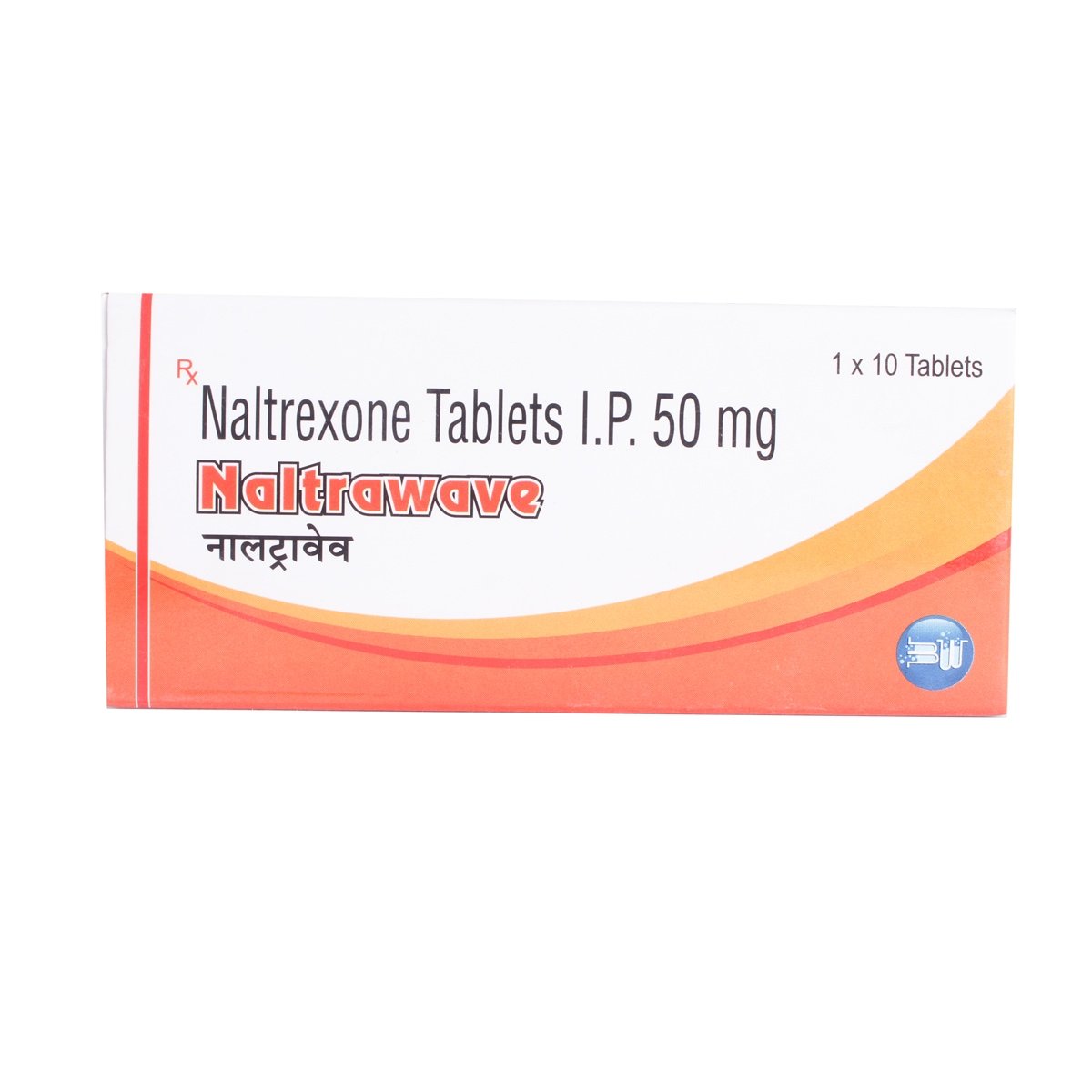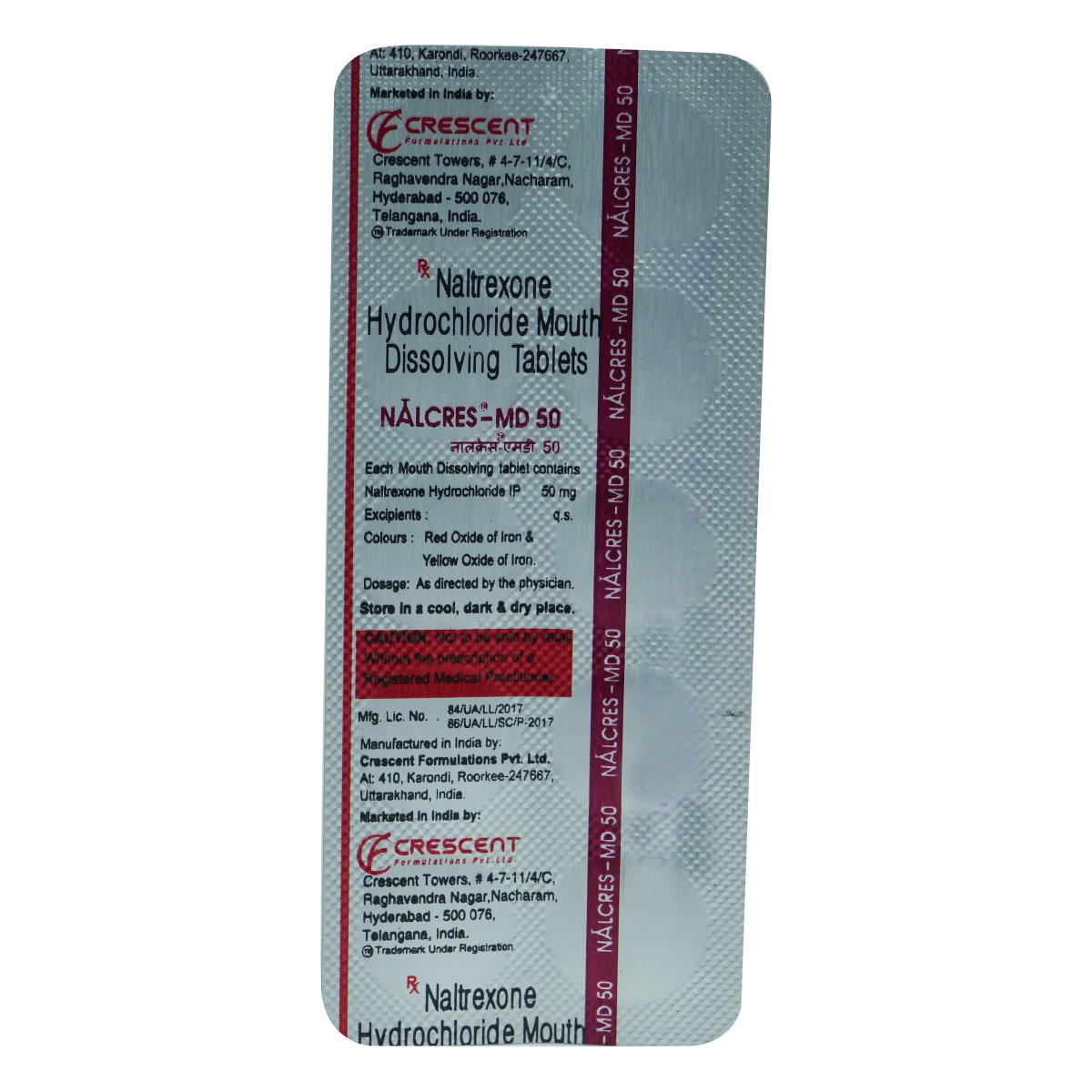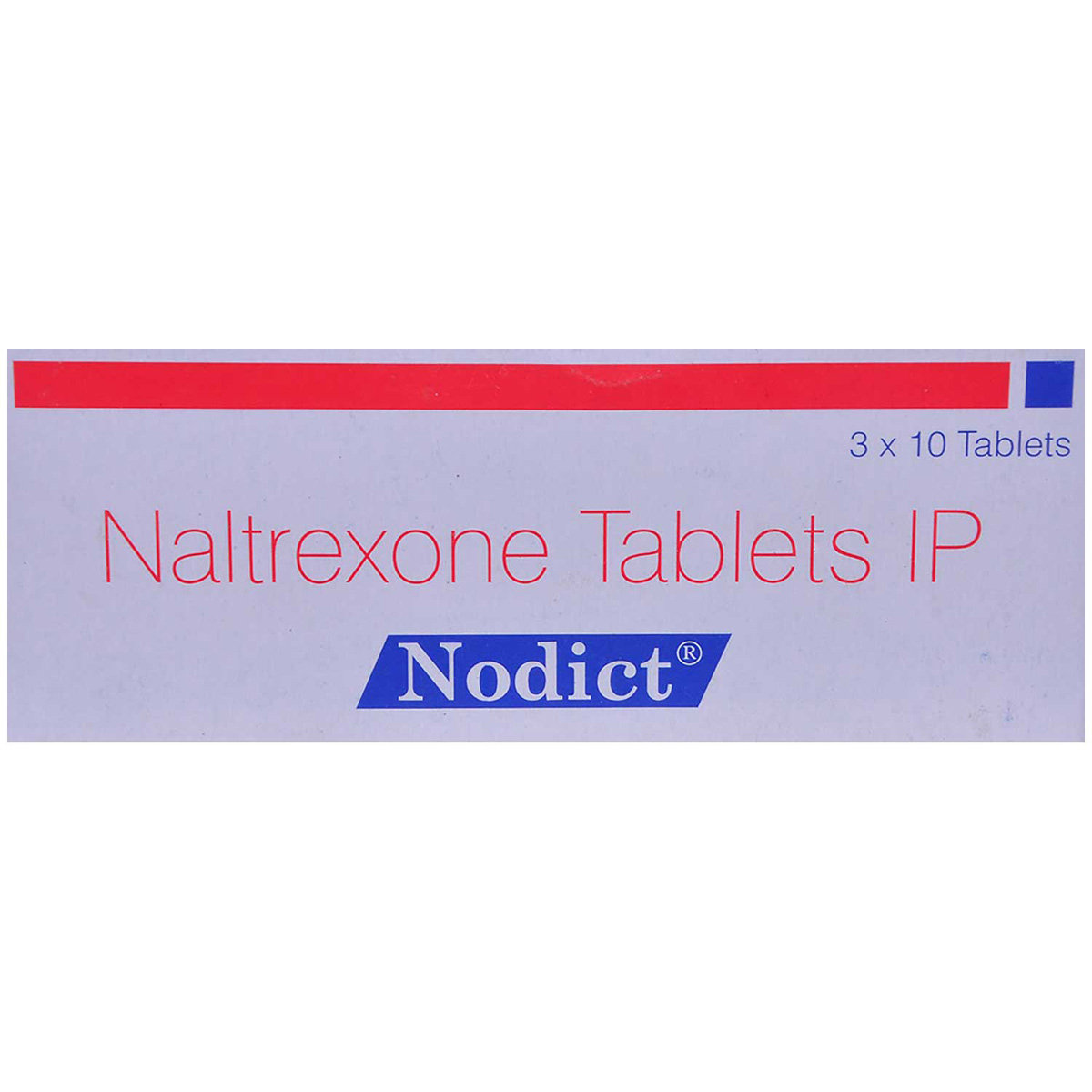Naltima 50 Tablet 10's
MRP ₹952.5
(Inclusive of all Taxes)
₹142.9 Cashback (15%)
Provide Delivery Location
Online payment accepted
 Prescription drug
Prescription drugWhats That
Composition :
Manufacturer/Marketer :
Consume Type :
Expires on or after :
Return Policy :
About Naltima 50 Tablet
Naltima 50 Tablet belongs to the class of medications called 'opioid-antagonist' used to treat alcohol dependence (chronic alcoholism) and opioid dependence. Alcohol dependence is a chronic medical condition that typically includes a current or past history of excessive drinking, a strong craving for alcohol, continued use despite repeated problems with drinking, and an inability to control alcohol consumption. Opioid dependence is a condition when someone becomes physically dependent on a substance; their body relies on it to avoid withdrawal.
Naltima 50 Tablet contains 'naltrexone'. It works by blocking the effect of opioid receptors and decreasing cravings and urges to use alcohol or opioids. Still, it is used along with counselling and social support to help patients dependent on alcohol abstain from drinking alcoholic drinks.
Naltima 50 Tablet should be taken as prescribed by your doctor. Some cases Naltima 50 Tablet may cause certain side effects such as nausea, vomiting, injection site reactions (including induration, pruritus, nodules and swelling), muscle cramps, dizziness or syncope, drowsiness or sedation, anorexia (eating disorder), decreased appetite or other appetite disorders, hepatic enzyme abnormalities, cold, insomnia, and toothache. Everyone need not experience the above side effects. If Naltima 50 Tablet causes any serious discomfort, speak with a doctor.
Before taking the Naltima 50 Tablet , let your doctor know about all your medical conditions (especially hepatitis or liver failure), allergic reactions, and all medications you are using (especially opioid analgesics). And also, inform your doctor if you are pregnant, planning to become pregnant, or breastfeeding. Naltima 50 Tablet may cause dizziness and sedation; therefore, avoid driving vehicles or operating machinery until you return to normal. Naltima 50 Tablet usage is contraindicated in patients with current physiologic opioid dependence, patients in acute opioid withdrawal, or any individual who has failed the naloxone challenge test or has a positive urine screen for opioids. If you notice mood changes while taking Naltima 50 Tablet , please consult a doctor immediately.
Uses of Naltima 50 Tablet
Directions for Use
Key Benefits
Naltima 50 Tablet contains naltrexone. It belongs to the class of medications called 'opioid-antagonist' used to treat alcohol dependence (chronic alcoholism) and opioid dependence. It works by blocking the effect of opioid receptors and decreasing cravings and urges to use alcohol or opioids. Still, it is used along with counselling and social support to help patients dependent on alcohol abstain from drinking alcoholic drinks.
Storage
- Hydrate your body: Drink enough water to prevent dehydration and headaches.
- Calm Your Mind: Deep breathing and meditation can help you relax and relieve stress.
- Rest and Recharge: Sleep for 7-8 hours to reduce headache triggers.
- Take rest: lie down in a quiet, dark environment.
- Cold or warm compresses can help reduce tension.
- Stay Upright: Maintain good posture to keep symptoms from getting worse.
- To treat headaches naturally, try acupuncture or massage therapy.
- Over-the-counter pain relievers include acetaminophen and ibuprofen.
- Prescription Assistance: Speak with your doctor about more substantial drug alternatives.
- Severe Headaches: Seek emergency medical assistance for sudden, severe headaches.
- Frequent Headaches: If you get reoccurring headaches, consult your doctor.
- Headaches with Symptoms: Seek medical attention if your headaches include fever, disorientation, or weakness.
- Prepare for a restful night's sleep: Develop a calming pre-sleep routine, like reading or meditation, to help your body relax and prepare for sleep.
- Create a sleep-conducive Environment: Make bedroom a sleep haven by ensuring it is quiet, dark and calm.
- Follow a Sleep Schedule: Go to bed and get up at the same time every day to help regulate your body's internal clock and increase sleep quality.
- Try relaxing techniques like deep breathing, mindfulness meditation and any others.
- Limit stimulating activities before bedtime: Avoid stimulating activities before bedtime to improve sleep quality.
- Monitor Progress: Keep track of your sleep patterns to identify areas for improvement.
- Consult a doctor if needed: If these steps don't improve your sleep, consult a doctor for further guidance and therapy.
- Inform your doctor about the nausea and discuss possible alternatives to the medication or adjustments to the dosage.
- Divide your daily food intake into smaller, more frequent meals to reduce nausea.
- Opt for bland, easily digestible foods like crackers, toast, plain rice, bananas, and applesauce.
- Avoid certain foods that can trigger nausea, such as fatty, greasy, spicy, and smelly foods.
- Drink plenty of fluids, such as water, clear broth, or electrolyte-rich beverages like coconut water or sports drinks.
- Use ginger (tea, ale, or candies) to help relieve nausea.
- Get adequate rest and also avoid strenuous activities that can worsen nausea.
- Talk to your doctor about taking anti-nausea medication if your nausea is severe.
- Record when your nausea occurs, what triggers it, and what provides relief to help you identify patterns and manage your symptoms more effectively.
- Inform Your Doctor: Notify your doctor immediately about your diarrhoea symptoms. This allows them to adjust your medication or provide guidance on managing side effects.
- Stay Hydrated: Drink plenty of fluids to replace lost water and electrolytes. Choose water, clear broth, and electrolyte-rich drinks. Avoid carbonated or caffeinated beverages to effectively rehydrate your body.
- Follow a Bland Diet: Eat easy-to-digest foods to help firm up your stool and settle your stomach. Try incorporating bananas, rice, applesauce, toast, plain crackers, and boiled vegetables into your diet.
- Avoid Trigger Foods: Steer clear of foods that can worsen diarrhoea, such as spicy, fatty, or greasy foods, high-fibre foods, and dairy products (especially if you're lactose intolerant).
- Practice Good Hygiene: Maintain good hygiene to prevent the spread of infection. To stay healthy, wash your hands frequently, clean and disinfect surfaces regularly, and avoid exchanging personal belongings with others.
- Take Anti-Diarrheal Medications: If your doctor advises, anti-diarrheal medications such as loperamide might help manage diarrhoea symptoms. Always follow your doctor's directions.
- Keep track of your diarrhoea symptoms. If they don't get better or worse or are accompanied by severe stomach pain, blood, or dehydration signs (like extreme thirst or dark urine), seek medical help.
- Drink water or other clear fluids.
- To prevent worsening of pain, limit intake of tea, coffee, or alcohol.
- Include bland foods like rice, toast, crackers, and rice in your diet.
- Avoid lying down immediately after eating as it may cause indigestion or heartburn.
- Avoid acidic and spicy food as it may cause indigestion.
- Please inform your doctor about joint pain symptoms, as they may adjust your medication regimen or prescribe additional medications to manage symptoms.
- Your doctor may prescribe common pain relievers if necessary to treat joint discomfort.
- Maintaining a healthy lifestyle is key to relieving joint discomfort. Regular exercise, such as low-impact sports like walking, cycling, or swimming, should be combined with a well-balanced diet. Aim for 7-8 hours of sleep per night to assist your body in repairing and rebuilding tissue.
- Applying heat or cold packs to the affected joint can help reduce pain and inflammation.
- Please track when joint pain occurs and any factors that may trigger it, and share this information with your doctor to help manage symptoms.
- If your joint pain is severe or prolonged, consult a doctor to rule out any underlying disorders that may require treatment.
- Avoid driving or operating machinery or activities that require high focus until you know how the medication affects you.
- Maintain a fixed sleeping schedule, create a relaxing bedtime routine and ensure your sleeping space is comfortable to maximize your sleep quality.
- Limit alcohol and caffeine as these may worsen drowsiness and disturb sleep patterns.
- Drink plenty of water as it helps with alertness and keeps you hydrated and for overall well-being.
- Moderate physical activity can improve energy levels, but avoid intense workouts right before bedtime.
Drug Warnings
Before your doctor prescribes the Naltima 50 Tablet , inform them of all your medical conditions (particularly hepatitis or liver failure), allergic reactions (with food and medications), and medications you are taking (especially opioid analgesics). Also, let your doctor know if you are pregnant, planning to become pregnant, or breastfeeding. Naltima 50 Tablet usage is contraindicated in patients with current physiologic opioid dependence, patients in acute opioid withdrawal, or any individual who has failed the naloxone challenge test or has a positive urine screen for opioids. Naltima 50 Tablet may cause dizziness and sedation; therefore, avoid driving vehicles or operating machinery until you return to normal. Do not use other medications without the doctor's notice, especially opioid-containing ones.
Drug-Drug Interactions
Drug-Drug Interactions
Login/Sign Up
Using Morphine with Naltima 50 Tablet can block morphine's effects, which reduces its ability to effectively treat illness.
How to manage the interaction:
Taking Morphine with Naltima 50 Tablet together is generally avoided as it can result in an interaction, but it can be taken if a doctor has advised it. Do not discontinue any medications without consulting a doctor.
Taking Methadone with Naltima 50 Tablet can increase the risk or severity of harmful side effects.
How to manage the interaction:
Taking Methadone with Naltima 50 Tablet is generally avoided as it can result in an interaction, it can be taken if a doctor has advised it. Do not discontinue any medications without consulting a doctor.
Taking Pethidine with Naltima 50 Tablet can block the effects of Pethidine and make the medication less effective.
How to manage the interaction:
Taking Pethidine with Naltima 50 Tablet is generally avoided as it can result in an interaction, it can be taken if a doctor has advised it. Do not discontinue any medications without consulting a doctor.
Combining Naltima 50 Tablet with Opium can block the effects of opium, which reduces its ability to effectively treat your illness.
How to manage the interaction:
Taking Naltima 50 Tablet with Opium is generally avoided as it can possibly result in an interaction, it can be taken if your doctor has advised it. However, if you experience nausea, vomiting, diarrhoea, aches, fever, runny nose, sneezing, nervousness, irritability, shivering, and abdominal cramps, contact a doctor immediately. Do not discontinue any medications without consulting a doctor.
Taking Naltima 50 Tablet with Pentazocine can reduce the effects of pentazocine and make the medication less effective.
How to manage the interaction:
Taking Pentazocine with Naltima 50 Tablet is generally avoided, but can be taken together if prescribed by a doctor. However, if you experience any symptoms like nausea, vomiting, diarrhoea, aches, fever, runny nose, sneezing, nervousness, irritability, shivering, and abdominal cramps, contact a doctor immediately. Do not stop using any medications without consulting a doctor.
Using Tapentadol together with Naltima 50 Tablet can block the effects of tapentadol, which reduces its ability to effectively treat your illness.
How to manage the interaction:
Taking Tapentadol with Naltima 50 Tablet is generally avoided as it can possibly result in an interaction, it can be taken if your doctor has advised it. However, if you experience confusion, hallucination, seizure, extreme changes in blood pressure, increased heart rate, fever, excessive sweating, blurred vision, muscle spasm or stiffness, tremors, stomach cramps, nausea, vomiting, and diarrhoea call a doctor right away. Do not stop using any medications without a doctor’s advice.
Coadministration of Naltima 50 Tablet with Dezocine can block the effects of Dezocine and make the medication less effective.
How to manage the interaction:
Taking Naltima 50 Tablet with Dezocine is generally avoided as it can result in an interaction, it can be taken if a doctor has advised it. Do not discontinue any medications without consulting a doctor.
Coadministration of Naltima 50 Tablet and Naloxegol can increase the effects of Naloxegol. This can increase the risk or severity of side effects.
How to manage the interaction:
Although taking Naltima 50 Tablet and Naloxegol together can evidently cause an interaction, it can be taken if your doctor has suggested it. Do not stop using any medications without first talking to your doctor.
Taking Leflunomide and Naltima 50 Tablet can increase the risk or severity of liver problems.
How to manage the interaction:
Although there is an interaction between Leflunomide and Naltima 50 Tablet, they can be taken together if prescribed by a doctor. However, if you experience fever, chills, joint pain or swelling, unusual bleeding or bruising, skin rash, itching, less desire to eat, fatigue, nausea, vomiting, abdominal pain, or yellowing of the skin or eyes, contact a doctor immediately. Do not discontinue any medications without consulting a doctor.
Drug-Food Interactions
Drug-Food Interactions
Login/Sign Up
Diet & Lifestyle Advise
- A patient is advised to have a diet that increases serotonin levels which makes a person feel good & involves eating foods high in carbohydrates, especially the complex carbohydrates present in starchy food items like legumes (e.g., beans, lentils and peas), root vegetables (e.g., potatoes and carrots), pasta and bread. Eating such foods in combination with protein in meals will benefit.
- Deficiencies in B-complex vitamins such as thiamine, folate or folic acid, and B12 are common with alcoholism, and inadequate stores of other B vitamins and vitamin C frequently occur. A patient should consume supplements and vitamins as per their doctor's recommendation.
- Malnutrition is common during alcohol consumption and is revealed slowly and gradually. The patient becomes very tired and develops a weaker immune system, which means the patient is more susceptible to infections. These problems need to be identified and treated during the recovery process—ideally by a team of healthcare professionals.
- The patient should change his drinking priorities and prefer drinks like apple cider, vanilla shake, mixing juice or lemonade with sparkling water etc.
- Get physical activity and enough rest.
- Reduce caffeine and stop smoking, if possible.
Side Effects of Naltima 50 Tablet
- Nausea
- Vomiting
- Injection site reactions (induration, pruritus, nodules and swelling)
- Muscle cramps
- Dizziness or syncope
- Somnolence or sedation
- Anorexia (eating disorder)
- Decreased appetite or other appetite disorders
- Hepatic enzyme abnormalities
- Cold
- Insomnia (Sleeping disorder)
- Toothache
Habit Forming
Therapeutic Class
All Substitutes & Brand Comparisons
RX
Naltox-50 Tablet 10's
D D Pharmaceuticals Pvt Ltd
₹800
(₹72.0 per unit)
16% CHEAPERRX
Nal 50 mg Tablet 10's
Cnx Health Care Pvt Ltd
₹804
(₹72.36 per unit)
15% CHEAPERRX
Addtrex 50 mg Tablet 10's
Rusan Pharma Ltd
₹826.5
(₹74.39 per unit)
13% CHEAPER
Drug-Diseases Interactions
Drug-Diseases Interactions
Login/Sign Up
FAQs
Drug-Drug Interactions Checker List
- CODEINE
- HYDROCODONE
- LEFLUNOMIDE
- DROPERIDOL
Special Advise
- It is recommended to monitor liver function tests regularly.
- Patients should be opioid-free for at least 7-10 days before initiating the treatment.
- Strictly warn patients against the use of opioids while on Naltima 50 Tablet .
- Monitor for injection-site reactions.
Disease/Condition Glossary
Alcohol dependence: Alcohol dependence is a chronic medical condition that typically includes a current or past history of excessive drinking, a strong craving for alcohol, continued use despite repeated problems with drinking, and an inability to control alcohol consumption. Symptoms include blackout, dizziness, shakiness, craving, sweating, aggression, anxiety, nausea or vomiting, loneliness, delirium or fear, problems with coordination, slurred speech, or tremor.
Opioid-dependence: Opioid dependence is a condition when someone becomes physically dependent on a substance; their body relies on it to avoid withdrawal. In this case, instead of making enough of its own opioids, the body has begun to rely on outside opioids to maintain normal function. Symptoms include craving or sweating, euphoria or general discontent, physical substance dependence, chronic constipation, small pupils, nausea, reduced sex drive, sensitivity to pain, shallow breathing, or slurred speech.

Have a query?
Alcohol
Safe if prescribed
Consumption of alcohol is not recommended during treatment with this medicine.
Pregnancy
Consult your doctor
There are no adequate and well-controlled studies of naltrexone in pregnant women. Naltima 50 Tablet should be used during pregnancy only if the potential benefit justifies the potential risk to the fetus.
Breast Feeding
Consult your doctor
Caution should be exercised while using Naltima 50 Tablet in nursing mother. Inform your doctor if you are a nursing mother. A decision should be made whether to discontinue nursing or discontinue the drug, considering the importance of the drug to the mother.
Driving
Safe if prescribed
Naltima 50 Tablet may cause side effects which could affect your ability to drive or operate machinery.
Liver
Consult your doctor
Naltima 50 Tablet should be used with caution in patients with liver disease. So, inform your doctor if you are with liver impairment. Regular monitoring of liver function tests is advisable while you are taking this medicine.
Kidney
Consult your doctor
Caution is recommended in administering Naltima 50 Tablet to patients with moderate to severe renal impairment. So, inform your doctor if you are with kidney impairment. Your doctor will weigh the benefits and potential risks before prescribing Naltima 50 Tablet .
Children
Safe if prescribed
Naltima 50 Tablet should not be used in children and adolescents under 18 since clinical data in this age group are unavailable.
Recommended for a 30-day course: 3 Strips

